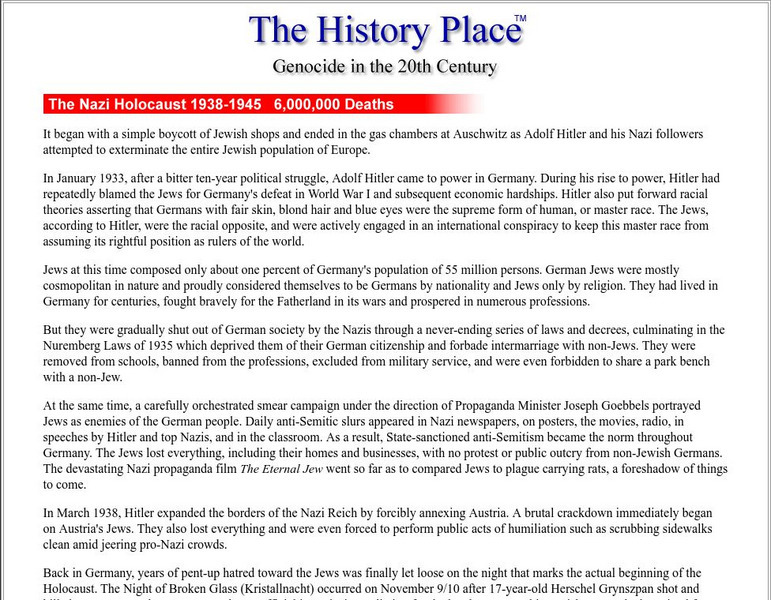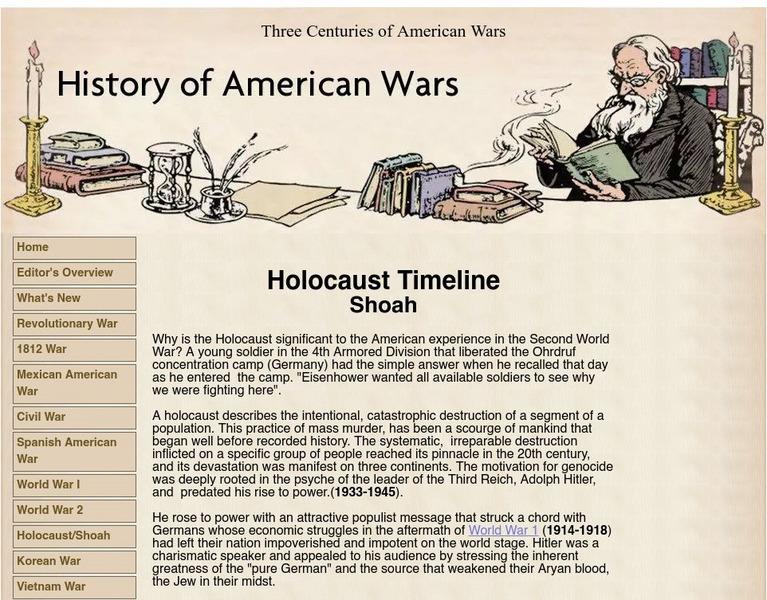Curated OER
A Study of Genocide and Project for Rememberance
Tenth graders examine the mass execution of Ukranian Jews by the Nazis at Babi Yar through a variety of sources, including: music, poetry, primary sources and photographs. They also design a memorial for the victims.
Curated OER
WAR child Canada's: GENOCIDE
Students identify reasons genocide occurs through group research into specific Genocide incidents of the 20th century. They put into perspective why an organization such as the United Nations is necessary by introducing them to one of...
Curated OER
Prejudice Discussion
Students discuss ethical dilemmas in a cooperative setting, and compare today's social problems with those present during the rise of the Nazi party.
Human Rights Watch
Human Rights Watch: Leave None to Tell the Story: Genocide in Rwanda
This site has the complete report from March 1999 that explains the history of the Rwandan genocide. This is an extensive resource and an excellent source of information.
PBS
Pbs Learning Media: Breaking New Ground
This video from Wide Angle provides a look at some of the women who are leading Rwanda in government, business and promoting peace.
US Holocaust Memorial Museum
Ushmm: Holocaust Encyclopedia: Racism
An explanation of the term "racism" and how it impacted the rise of Nazism and World War II.
US Holocaust Memorial Museum
U.s. Holocaust Memorial Museum: Euthanasia Program
A detailed article covering the establishment of the euthanasia program initiated by Adolf Hitler's regime.
US Holocaust Memorial Museum
U.s. Holocaust Memorial Museum: Vilna
A history of the German occupation of Vilna, and the Nazi extermination of the large Jewish population there.
US Holocaust Memorial Museum
U.s. Holocaust Memorial Museum: Lublin/majdanek Concentration Camp
An account of the role the Majdanek concentration camp in Poland played both in providing labor for the Nazi war effort and in the "final solution" the Nazis planned.
US Holocaust Memorial Museum
U.s. Holocaust Memorial Museum: Gassing Operations
A description of the Nazi use of poison gas to eliminate "undesirable" persons, whether because of their physical or mental health, or because of their religious or ethnic dispositions.
US Holocaust Memorial Museum
U.s. Holocaust Memorial Museum: Genocide
A detailed explanation of the origin and meaning of the term "genocide."
US Holocaust Memorial Museum
U.s. Holocaust Memorial Museum: Sobibor
A description of the Nazi concentration camp at Sobibor in Poland, and of the prisoner uprising there.
US Holocaust Memorial Museum
U.s. Holocaust Memorial Museum: Treblinka
A description of the Nazi development and use of the extermination camp at Treblinka in Poland during World War II.
US Holocaust Memorial Museum
U.s. Holocaust Memorial Museum: Westerbork
Article about the camp at Westerbork, the Netherlands, originally created by the Dutch to intern Jewish refugees, but later used as a transit camp by the Nazis, a holding place for Jews being sent to other concentration camps.
US Holocaust Memorial Museum
U.s. Holocaust Memorial Museum: "Final Solution": Overview
Site created by the US Holocaust Memorial Museum to explain the Final Solution, the Nazi plan to exterminate all Jewish people. Site provides extensive information about the plan and the method by using pictures and written descriptions....
PBS
Pbs Learning Media: Suffering and Recovery
Learn about the role local churches played in bringing Hutus and Tutsis together in the aftermath of the Rwandan genocide in this Wide Angle video segment.
PBS
Pbs Learning Media: Small Business
This video from Wide Angle profiles Rwanda's new economy through the small business of Epiphanie Mukashyaka, a woman widowed by recent genocide.
US Holocaust Memorial Museum
Ushmm: Holocaust Encyclopedia: Genocide of European Roma (Gypsies)
Article detailing the persecution and annihilation of much of the European Roma population under Nazi orders during World War II, and the continued persecutionof the remaining Roma population in many countries after the war.
US Holocaust Memorial Museum
Ushmm: Holocaust Encyclopedia: Children During the Holocaust
Read about the plight of children, especially Jewish and Roma children, during the Holocaust
US Holocaust Memorial Museum
Ushmm: Holocaust Encyclopedia: Jewish Population of Europe, 1933
Data by country of the Jewish population in Europe prior to World War II.
US Holocaust Memorial Museum
Ushmm: Holocaust Encyclopedia: Pogroms
An explanation of the term "pogrom" and examples of pogroms in both 19th and early 20th century Russia, and in Germany and Eastern Europe during World War II.
US Holocaust Memorial Museum
Ushmm: Holocaust Encyclopedia: Mosaic of Victims
An analysis of the scope of Nazi persecution during World War II, including the Jews, Poles, Roma, and any groups people who did not support the Nazi cause.
The History Place
The History Place: The Nazi Holocaust 1938 1945
Article depicting the Nazi Holocaust from the beginning in 1938 with a simple boycott to the end in 1945 with the liberation of the death camps.
History of American Wars
History of American Wars: Holocaust Timeline: Shoah
An extensive timeline showing the events between 1933 and 1945 that occurred during the progression of the Jewish Holocaust. It begins with several paragraphs describing the nature of the Holocaust.








